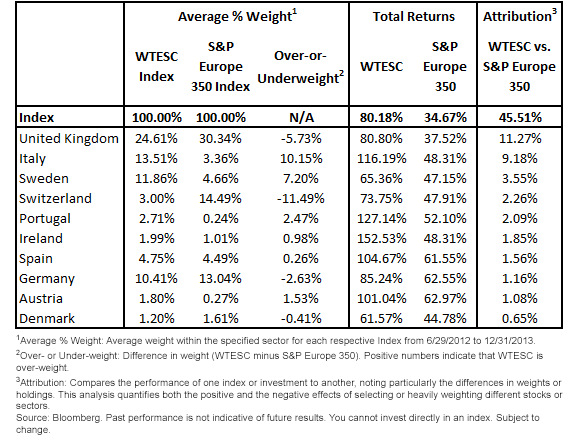Small Cap Equities Performing Strongly Across European Countries


 Average Annual Returns (as of 12/31/2013)
Average Annual Returns (as of 12/31/2013)
 Completion and Complementarity
In our prior blog post, which focused on WTESC’s sector exposures and their resultant attribution over this same period, we concluded with emphasizing WTESC’s potential complementarity to more large-cap-focused approaches. We believe the same can be said for this analysis of country exposures. Within Europe, a focus on large-cap stocks results in different sector exposures across countries than does a focus on small-cap stocks. For example, in the United Kingdom, which we highlighted earlier, a focus on small caps delivered greater economic sensitivity and under-weights to typically defensive sectors (Consumer Staples, Health Care, Telecommunication Services and Utilities), as well as Financials and Energy. In looking at ways to generate European equity exposure, small caps could offer a potentially differentiated approach and performance experience across different country markets.
1Source: Bloomberg, period 6/29/2012 to 12/31/2013.
2Source: Bloomberg; refers to average % weight and attribution for period 6/29/2012 to 12/31/2013.
3Source: Bloomberg; refers to average % weight an attribution for period 6/29/2012 to 12/31/2013.
4Source: Bloomberg; period 6/29/2012 to 12/31/2013.
Completion and Complementarity
In our prior blog post, which focused on WTESC’s sector exposures and their resultant attribution over this same period, we concluded with emphasizing WTESC’s potential complementarity to more large-cap-focused approaches. We believe the same can be said for this analysis of country exposures. Within Europe, a focus on large-cap stocks results in different sector exposures across countries than does a focus on small-cap stocks. For example, in the United Kingdom, which we highlighted earlier, a focus on small caps delivered greater economic sensitivity and under-weights to typically defensive sectors (Consumer Staples, Health Care, Telecommunication Services and Utilities), as well as Financials and Energy. In looking at ways to generate European equity exposure, small caps could offer a potentially differentiated approach and performance experience across different country markets.
1Source: Bloomberg, period 6/29/2012 to 12/31/2013.
2Source: Bloomberg; refers to average % weight and attribution for period 6/29/2012 to 12/31/2013.
3Source: Bloomberg; refers to average % weight an attribution for period 6/29/2012 to 12/31/2013.
4Source: Bloomberg; period 6/29/2012 to 12/31/2013.
Important Risks Related to this Article
Investments focused in Europe are increasing the impact of events and developments associated with the region, which can adversely affect performance. Foreign investing involves special risks, such as risk of loss from currency fluctuation or political or economic uncertainty. Investments focusing on certain sectors and/or smaller companies increase their vulnerability to any single economic or regulatory development. This may result in greater share price volatility. Recent growth rate in the stock market has helped to produce short-term returns for some asset classes.

Christopher Gannatti began at WisdomTree as a Research Analyst in December 2010, working directly with Jeremy Schwartz, CFA®, Director of Research. In January of 2014, he was promoted to Associate Director of Research where he was responsible to lead different groups of analysts and strategists within the broader Research team at WisdomTree. In February of 2018, Christopher was promoted to Head of Research, Europe, where he was based out of WisdomTree’s London office and was responsible for the full WisdomTree research effort within the European market, as well as supporting the UCITs platform globally. In November 2021, Christopher was promoted to Global Head of Research, now responsible for numerous communications on investment strategy globally, particularly in the thematic equity space. Christopher came to WisdomTree from Lord Abbett, where he worked for four and a half years as a Regional Consultant. He received his MBA in Quantitative Finance, Accounting, and Economics from NYU’s Stern School of Business in 2010, and he received his bachelor’s degree from Colgate University in Economics in 2006. Christopher is a holder of the Chartered Financial Analyst Designation.

